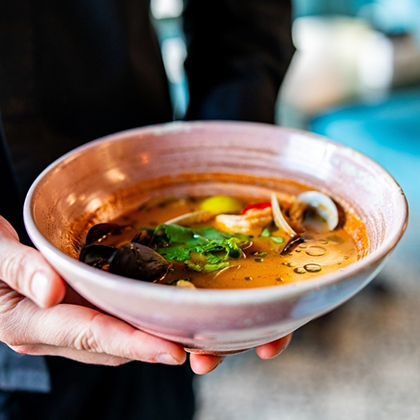News
The Michelin Guide: the big effects of the little red book on restaurant behaviour
Is being honored by the prestigious Michelin Guide really an opportunity for a restaurant? A study of restaurants in Washington D.C. conducted by Saverio Favaron, assistant professor and researcher in Strategy at SKEMA Business School, reveals how high-standing organisations react to a sudden and positive change in their status.
On March 6, 2023, a few minutes after 10 in the morning, the lights of the Palais de la musique et des congrès in Strasbourg go off. A countdown, on a very martial tune, announces the official opening of the ceremony. Over 600 chefs, dressed in their pristine uniforms, fill the amphitheater, eagerly anticipating the announcement of the new Michelin stars. After a brief address by the president of the Alsace departmental council, Gwendal Poullenec, the director of Michelin, steps into the spotlight. He announces that a very special message was delivered.
The French President Emmanuel Macron appears on a massive screen. He praises the Michelin Guide as the “bible of our gastronomy” and laudes the chefs for their contributions to the culinary world and society at large, “restaurants, whether large or small, create life”. Despite the lengthy speech and the growing impatience among the audience, the excitement is palpable, as these professionals await the unveiling of the prestigious awards.
The Michelin Guide as a status shock
This momentous occasion underscores the influence and impact that the Michelin Guide holds in the realm of fine dining. The recognition conferred by the Michelin stars can dramatically alter the fortunes of a restaurant, catapulting it to new heights of prestige and success. However, such success can also be accompanied by immense pressure and insecurity as demonstrated by the story of Marco Pierre White and other chefs who made the shocking decision to return his stars and retire from the kitchen, citing the unbearable pressure to maintain the elite status that so many chefs strive for.
More recently, plenty of award-winning chefs have shifted focus away from their fine dining flagships—or scrapped them entirely, due to the anxiety associated with the star system and the costs to maintain award-winning establishments. These examples highlights the potential pitfalls that can befall those who achieve high-status positions and the complex dynamics that often surround such recognitions.
Status is a powerful force in the world of business. Companies and individuals work hard to achieve high status, which can lead to increased visibility, access to resources, and performance advantages. However, the unstable and highly visible nature of status hierarchies can also be a source of insecurity for those who find themselves at the top. This insecurity can lead to compensatory actions and attempts to conform to expectations associated with a high-status position.
In a recent study we examined how organizations that experience a positive status shock react to their newfound position, shedding light on the complexities of navigating elite status.



